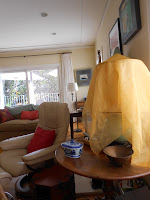 |
| The draped lamp |
For three months, I've been following a doctor-prescribed routine to help me get to sleep. At 10 pm, I drape a lamp, sit in my chair in the living room, and read for an hour or so. No bright lights, no computer, no TV. Then I listen to five minutes of a hypnotherapy tape and get into bed.
By trial and error, I've found books that engage me but aren't too upsetting or challenging. I have other books, such as a riveting Japanese mystery that features cutting up bodies, that I read at lunch.
Here are a few bedtime reads, in no particular order:
In the Garden of the Beasts, by Erik Larson. The story of William Dodd, the US ambassador to Germany from 1933-37. A mild-mannered, well-meaning academic, Dodd took his wife and adult children with him to Berlin, where they witnessed the flowering of the Third Reich and had social encounters with Hitler and other now-infamous Nazis. I liked learning more about the history of that time and place through the lens of a family, which damped down the horror.
 The Submission
The Submission, Amy Waldman. A committee of survivors, artists, critics, and politicians unwittingly chooses the design of an Arab-American architect for the 9/11 memorial in a blind competition. All hell breaks lose when his identity becomes known. There's not one completely sympathetic character, and some are in dire need of a comeuppance.
 Below Stairs
Below Stairs, by Margaret Powell. If you think the servants on "Downtown Abbey" like their jobs, think again. Mrs. Powell was a housemaid and then a cook in the early twentieth century, and she tells it like it is. So much for the romance of "downstairs." People can be beasts to servants. She married a plumber and escaped, big relief.
 A Widow's Story: A Memoir
A Widow's Story: A Memoir, by Joyce Carol Oates. "People" magazine calls it "a chronicle of grief." I call it a long-winded memoir of the several months after Oates's husband died. Just the facts, m'am, and a little less rumination and metaphor! But then that's my problem with Oates's works. Spoiler alert: She remarries less than a year after her husband dies, to fellow Princeton professor whom she meets at the very end of the book. To be fair, I think she's remarkably honest about the isolating wilderness of grief she found herself in.
 Making Toast
Making Toast, by Roger Rosenblatt. A sad but compelling memoir about Rosenblatt and his wife going to live with their late daughter's family, including three very young grandchildren, after the daughter's sudden death in her thirties. They and their son-in-law are now raising the children in Bethesda, a five-hour drive from the Rosenblatts' home on Long Island, which they've kept for occasional visits. The children's grief and how they express it is especially heart-breaking.
A Singular Woman: The Untold Story of Barack Obama's Mother, by Janny Scott. We know almost nothing about Obama's mother except that she was an anthropologist who married an African man. This was a very intelligent, feminist woman who earned a Ph.D., wanted the best for her two kids, who loved men but couldn't seem to make two marriages work for her, and who died way too young, at 52, of ovarian cancer.
And books for newly-struggling insomniacs and readers-on-the-beach-or-planes:
Minding Frankie and
Heart and Soul by Maeve Binchy and
Lady Killer by Lisa Scottoline. The first two are romantic, everything-falls-into-place books set in Ireland, and the third is a mystery with an Italian-American lawyer heroine in Philadelphia.









.JPG)










































